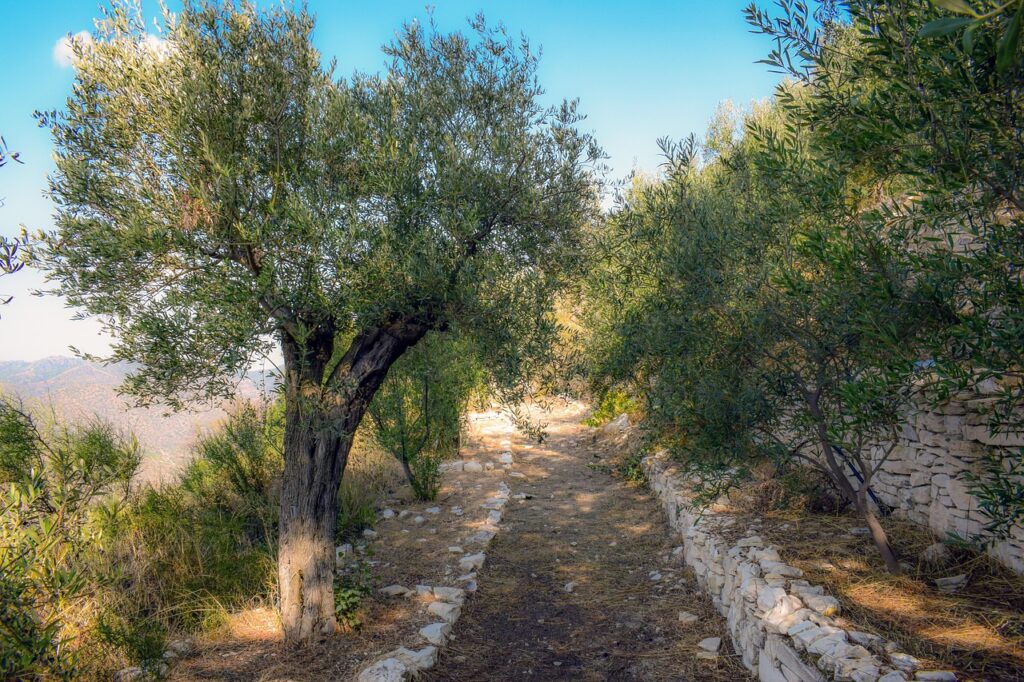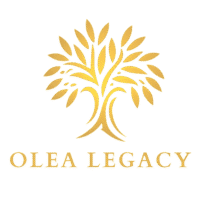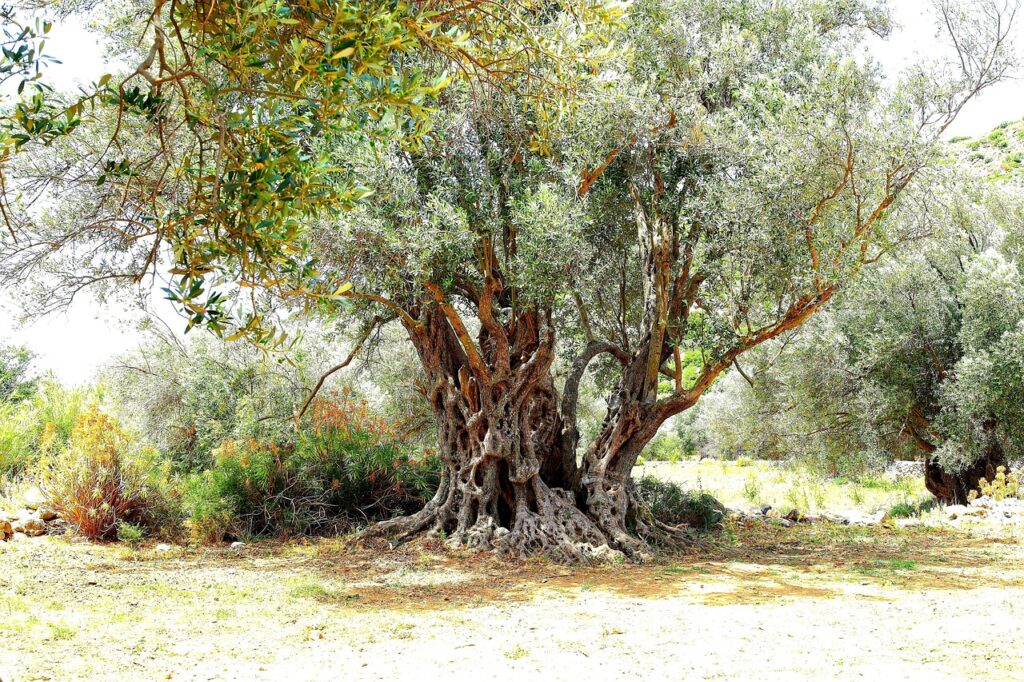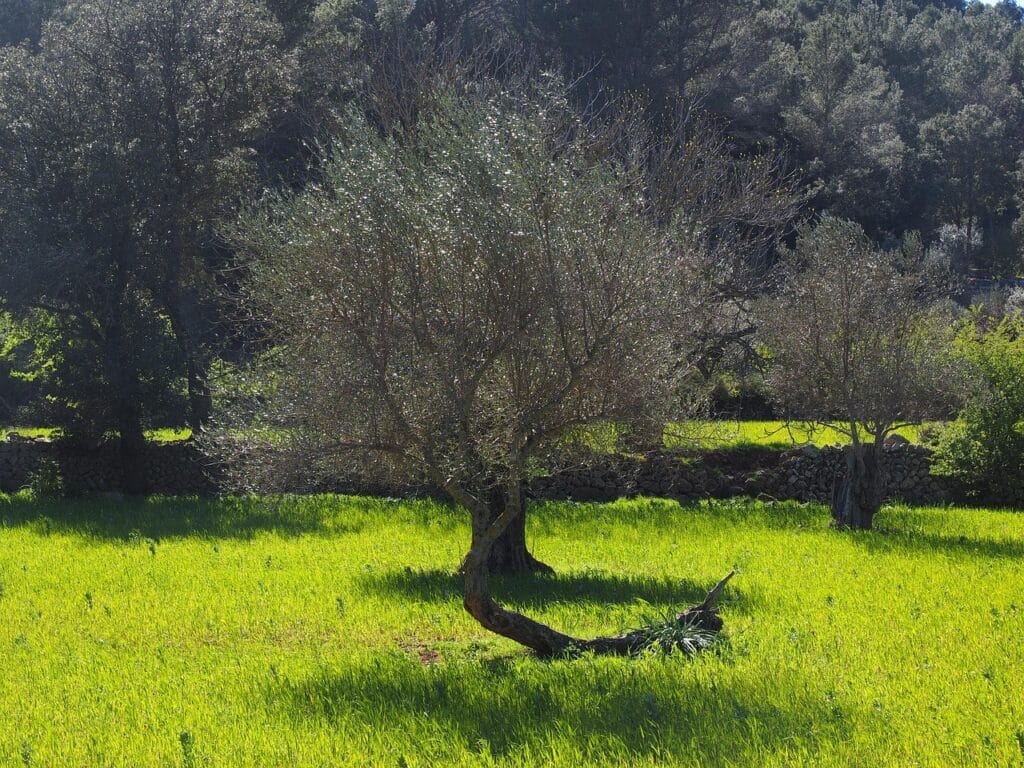The Eternal Tree
Why the Olive Tree Has Been Honoured for Millennia
There are trees, and then there are olive trees.
Twisted with age, rich with history, and endlessly regenerative, the olive tree has long stood as a sacred symbol of wisdom, peace, victory, longevity, and divine favor.
These gnarled evergreens aren’t just plants. They are living testaments to resilience. Cut an olive tree down, and new shoots will sprout from its roots, allowing the tree to continuously regenerate and live on for centuries.
In Greece, its roots run deeper than soil, they run through mythology, religion, family, and the land itself.
At Olea Legacy, every tree we offer isn’t just a plant. It’s a living monument to a culture, a heritage, and a timeless story. Below, we explore why the olive tree has been revered for thousands of years and why this legacy still matters today.
The eternal tree. A Gift from the Gods
In Greek mythology, the olive tree was not merely created, it was won in divine combat.
The city of Athens owes its name to the goddess Athena, who competed with Poseidon for patronage of the city. Poseidon struck the Acropolis rock with his trident and produced a saltwater spring (or in some tales, a war-horse), showcasing his power.
Athena, however, offered something more practical and life-giving: she planted the first olive tree on the Acropolis. Her offering, more valuable than Poseidon’s seawater, was deemed a symbol of wisdom and prosperity.
The people chose Athena’s gift, and so the olive tree became Greece’s eternal emblem of peace and wealth.
To this day, descendants of that mythical tree stand tall near the Erechtheion on the Acropolis, watched over by stone Caryatids and time itself.
According to legend, when the Persians burned Athens in 480 B.C., the sacred olive tree was charred, but by the next day a new shoot sprung from the ash, a sign of Athena’s enduring favor.
Through wars and centuries, the sacred olive tree of Athens has always been replanted or reborn, a direct living link to the ancient myth.
A Tree That Outlives Empires
Some olive trees in Greece are more than 2,000 years old, predating empires, surviving wars, droughts, and the rise and fall of civilizations.
On the island of Crete, for example, an olive tree in Ano Vouves is estimated to be at least two millennia old (and possibly over 3,000–4,000 years by some estimates). Remarkably, it still produces olives today.
Unlike other trees that come and go within a few generations, the olive tree endures. Its trunk may hollow with age and its branches may wither, but from the base new life continually emerges. These ancient trees have survived countless droughts and even fires, regenerating themselves from their resilient root systems. It’s not uncommon for a single tree to nourish dozens of lifetimes.
Owning such a tree is not just symbolic. It’s transformative. It means becoming part of something that will likely outlast you, and potentially your children’s children.
When you claim stewardship of an olive tree that has seen the passing of centuries, you join a lineage of caretakers. In an almost literal sense, you become a thread of history that the tree has witnessed as few living things on earth offer a connection to antiquity like a worshipped olive tree does.
The Olive Tree in Religion and Ritual
No matter the path, the olive tree finds a place in spiritual narratives around the world.
In ancient Greece, olive oil was used to smear Olympian champions and kings, to light sacred lamps, and to honor the dead. Victors of the original Olympic Games were crowned with olive wreaths cut from venerable trees, a high honor symbolizing glory and peace.
This tradition continued even in modern times, when wreaths from a 2,000-year-old Cretan olive tree were used to crown winners of the 2004 Athens Olympics, highlighting how the olive tree bridges ancient and modern worlds.
In Christianity, the olive branch signifies peace and renewal. According to the Bible, a dove brought an olive leaf to Noah to show the flood had receded, symbolizing the promise of new life after the deluge.
Ever since, extending an “olive branch” has meant offering peace. Olive oil also became a sacred element used for anointing prophets and kings, and burning in temple lamps as a symbol of God’s spirit and purity.
In Judaism, the olive is one of the Seven Species blessed in the Hebrew Bible (Deuteronomy 8:8) that symbolize the bounty of the Promised Land. The lamps of the ancient Jewish Temple were fed with pure olive oil, and to this day during Hanukkah, olive oil lamps commemorate the miracle of lasting light. The gnarled trunks of ancient olive trees in Israel are often seen as witnesses to biblical history, and the olive tree’s ability to survive and renew is used as an analogy for the endurance of the Jewish people.
In Islam, the olive tree is considered a blessed tree, a beacon of divine light. The Quran uses the imagery of an olive tree in the famous Verse of Light, describing a lamp fueled by the oil of a “blessed tree, an olive tree, neither of the East nor West, whose oil would almost glow even untouched by fire…”. Many interpret this as the olive being a source of spiritual illumination.
The Prophet Muhammad also reportedly extolled the virtues of olive oil for its health and blessing.
Across these traditions, the olive stands for more than a crop.
It’s a connection between the earthly and the divine. Whether used in ritual, as medicine, or as food, it carries a sacred significance. It’s as if the tree’s patient endurance and generous fruiting have taught us lessons in peace, faith, and renewal.
Even today, the olive branch remains a universal icon of peace, famously, the emblem of the United Nations features a world map encircled by olive branches as a symbol of global hope and unity.
Why This Legacy Still Matters Today
At Olea Legacy, we don’t just produce olive oil, we preserve living history.
Every tree in our care is rooted in a historic Greek grove, and every client becomes part of its ongoing story.
In a world obsessed with fast results and fleeting trends, the olive tree offers something radically different: permanence, patience, and peace.
Why does this ancient legacy matter now more than ever? Because in our modern lives, we crave authenticity and connection.
An olive tree that has quietly grown since the time of Aristotle or Christ provides a perspective that humbles and inspires.
Its very presence is a reminder that the best things in life like wisdom, harmony, and resilience grow slowly.
By tending an olive tree, we tap into timeless values: stewardship of the earth, respect for our ancestors, and hope for future generations. The tree becomes a personal symbol of longevity and balance in one’s life.
Moreover, olive groves support biodiversity and sustainable agriculture, thriving in harsh climates with minimal resources.
In an age of climate concern, these groves exemplify harmony with nature. The continued flourishing of ancient olives is a testament to careful cultivation and respect for the land, principles we uphold at Olea Legacy.
When you support this legacy, you’re not just purchasing a product. You’re investing in the preservation of cultural and environmental heritage.
Your Olive Tree Awaits
You’re not just buying olive oil. You’re claiming a legacy.
When you join Olea Legacy, you’re invited to own, visit, and steward an olive tree that may be several centuries older than you.
It’s a gesture of luxury, but also of vision of a way to own a living piece of Greece. You become part of a story that started thousands of years ago and is still unfolding.
Imagine walking through an ancient Greek olive grove to find your tree, its silver-green leaves whispering in the breeze. You run your hand over its knotted trunk, knowing it sprouted before your ancestors were born.
Each harvest, you taste the difference: oil pressed from olives that drew sustenance from Homeric soil and sunshine. This is more than a product. It’s your personal stake in a timeless tradition, a taste of immortality in the palm of your hand.
In embracing an olive tree, you inherit a symbol of longevity, of peace, and of profound meaning. The eternal tree has weathered millennia of history, now its story becomes intertwined with yours.
Your olive tree awaits. A living monument to hope and heritage that you can nurture and pass down, just as it has been passed down to us.
Ready to Own a Piece of Greece?
Discover our Ownership Packages and begin your journey today.



